| Listing 1 - 10 of 17 | << page >> |
Sort by
|
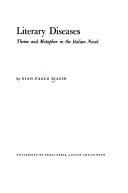
ISBN: 0292746148 Year: 1975 Publisher: Austin, Tex.
Abstract | Keywords | Export | Availability | Bookmark
 Loading...
Loading...Choose an application
- Reference Manager
- EndNote
- RefWorks (Direct export to RefWorks)
Fiction --- Italian literature --- Diseases in literature. --- Italian fiction --- Medical fiction --- Mental illness in literature. --- History and criticism.
Book
ISBN: 9508450940 Year: 2000 Publisher: Rosario : Viterbo,
Abstract | Keywords | Export | Availability | Bookmark
 Loading...
Loading...Choose an application
- Reference Manager
- EndNote
- RefWorks (Direct export to RefWorks)
Book
ISBN: 9784101123028 4101123020 Year: 1996 Publisher: 東京 新潮社
Abstract | Keywords | Export | Availability | Bookmark
 Loading...
Loading...Choose an application
- Reference Manager
- EndNote
- RefWorks (Direct export to RefWorks)
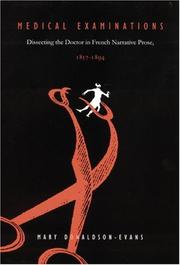
ISBN: 0803202474 9780803202474 0803266286 9780803266285 Year: 2000 Publisher: Lincoln University of Nebraska Press
Abstract | Keywords | Export | Availability | Bookmark
 Loading...
Loading...Choose an application
- Reference Manager
- EndNote
- RefWorks (Direct export to RefWorks)
Medical fiction --- Literature and medicine --- Physicians in literature. --- French fiction --- Medicine and literature --- Medicine --- History and criticism. --- History --- History and criticism
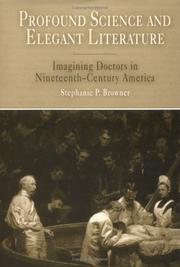
ISBN: 0812201485 0812238257 1322510504 Year: 2005 Publisher: Philadelphia : University of Pennsylvania Press,
Abstract | Keywords | Export | Availability | Bookmark
 Loading...
Loading...Choose an application
- Reference Manager
- EndNote
- RefWorks (Direct export to RefWorks)
In 1847, at the first meeting of the American Medical Association, the newly elected president reminded his brethren that the profession, "once venerated," no longer earned homage "spontaneously and universally." The medical marketplace was crowded and competitive; state laws regulating medical practice had been repealed; and professional practitioners were often branded by their lay competitors as aristocrats bent on establishing a health care monopoly. By 1900, the battles were over, and, as the president of AMA had hoped, doctors were now widely venerated as men of profound science, elegant literature, polite accomplishments, and virtue. In fact, by 1900 the doctor had replaced the minister as the most esteemed professional in the United States; disease loomed larger than damnation; and science promised to manage the discord, differences, and excesses that democracy seemed to license. In Profound Science and Elegant Literature, Stephanie Browner charts this trajectory-and demonstrates at the same time that medicine's claims to somatic expertise and managerial talent did not go uncontested. Even as elite physicians founded institutions that made professional medicine's authority visible and legitimate, many others worried about the violence that might attend medicine's drive to mastery and science's equation of rational disinterest with white, educated masculinity. Reading fiction by a wide range of authors beside and against medical texts, Browner looks to the ways in which writers such as Hawthorne, Melville, Holmes, James, Chesnutt, and Jewett inventoried the collateral damage that might be done as science installed its peculiar understanding of the body. A work of impressive interdisciplinary reach, Profound Science and Elegant Literature documents both the extraordinary rise of professional medicine in the United States and the aesthetic imperative to make the body meaningful that led many American writers to resist the medicalized body.
Medicine in literature. --- Physicians --- Medical fiction, American --- Literature and science --- Literature and medicine --- Physicians in literature. --- American literature --- Poetry and science --- Science and literature --- Science and poetry --- Science and the humanities --- American medical fiction --- American fiction --- Medicine and literature --- Medicine --- Medical care in literature --- History and criticism. --- History --- American History. --- American Studies. --- Cultural Studies. --- Literature.
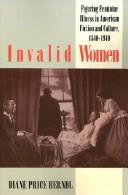
ISBN: 0807863904 0585025746 9780585025742 9780807863909 0807821039 9780807821039 0807844063 9780807844069 9798890864529 Year: 1993 Publisher: Chapel Hill University of North Carolina Press
Abstract | Keywords | Export | Availability | Bookmark
 Loading...
Loading...Choose an application
- Reference Manager
- EndNote
- RefWorks (Direct export to RefWorks)
Invalids in literature. --- Sick in literature. --- Diseases in literature. --- Women with disabilities in literature. --- Medical fiction, American --- American fiction --- Women with disabilities --- Women and literature --- Handicapped women --- Physically handicapped women --- People with disabilities --- American medical fiction --- Physically handicapped women in literature --- History and criticism. --- History. --- History --- American fiction - 19th century - History and criticism. --- Women and literature - United States - History - 19th century. --- Women and literature - United States - History - 20th century. --- American fiction - 20th century - History and criticism. --- Women with disabilities - United States - History. --- Medical fiction, American - History and criticism.
Book
ISBN: 147449322X 1474493211 147449319X Year: 2023 Publisher: Edinburgh : Edinburgh University Press,
Abstract | Keywords | Export | Availability | Bookmark
 Loading...
Loading...Choose an application
- Reference Manager
- EndNote
- RefWorks (Direct export to RefWorks)
'(P)rescription Narratives' reveals how the act of narrative creates the subjects of disability, race, and gender during a period of censorship in American history. It astutely argues that women writers of medical fiction practice storytelling as a form of narrative medicine that prescribes various forms of healing as an antidote to the shame engineered by an American culture of censorship.
American fiction --- Censorship --- Disabilities in literature. --- Human body in literature. --- Medical fiction, American --- Women in literature. --- Women with disabilities in literature. --- LITERARY CRITICISM / Feminist. --- Physically handicapped women in literature --- Woman (Christian theology) in literature --- Women in drama --- Women in poetry --- American medical fiction --- Body, Human, in literature --- Human figure in literature --- Book censorship --- Books --- Literature --- Literature and morals --- Anticensorship activists --- Challenged books --- Expurgated books --- Intellectual freedom --- Prohibited books --- Women authors --- History and criticism. --- History. --- Law and legislation

ISBN: 0807844063 9780807844069 Year: 1993 Publisher: Chapel Hill The University of North Carolina Press
Abstract | Keywords | Export | Availability | Bookmark
 Loading...
Loading...Choose an application
- Reference Manager
- EndNote
- RefWorks (Direct export to RefWorks)
American fiction --- Women and literature --- Women with disabilities --- Medical fiction, American --- Women with disabilities in literature. --- Invalids in literature. --- Diseases in literature. --- Sick in literature. --- History and criticism. --- History --- History. --- Pathology --- Fiction --- Sociology of minorities --- Sociology of the family. Sociology of sexuality --- anno 1800-1899 --- anno 1900-1999 --- United States --- United States of America --- Disability --- Literature --- Images of women --- Illnesses --- Book
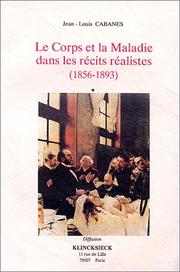
ISBN: 2252027592 9782252027592 Year: 1991 Publisher: Paris : Klincksieck,
Abstract | Keywords | Export | Availability | Bookmark
 Loading...
Loading...Choose an application
- Reference Manager
- EndNote
- RefWorks (Direct export to RefWorks)
Body [Human ] in literature --- Corps humain dans la littérature --- Diseases in literature --- Human body in literature --- Lichaam [Menselijk ] in de literatuur --- Littérature réaliste --- Maladies dans la littérature --- Menselijk lichaam in de literatuur --- Naturalism in literature --- Naturalisme dans la littérature --- Naturalisme in de literatuur --- Neorealism (Literature) --- Neorealisme (Literatuur) --- Néoréalisme (Littérature) --- Realism (Literary movement) --- Realism in literature --- Realisme (Letterkundige beweging) --- Realisme (Literaire beweging) --- Realisme in de literatuur --- Realistische literatuur --- Réalisme (Mouvement littéraire) --- Réalisme dans la littérature --- Ziekten in de literatuur --- French fiction --- Body, Human, in literature. --- Medical fiction --- Diseases in literature. --- Realism in literature. --- History and criticism. --- -Body, Human, in literature --- -Hospital fiction --- Hospitals --- Medical care --- Medicine --- Fiction --- Magic realism (Literature) --- Mimesis in literature --- Body, Human, in literature --- Human figure in literature --- French literature --- History and criticism --- Human body in literature. --- -History and criticism --- -Neorealism (Literature) --- Hospital fiction --- 19th century --- French fiction - 19th century - History and criticism --- Medical fiction - History and criticism. --- Corps humain dans la litterature --- Maladie dans la litterature --- Roman realiste
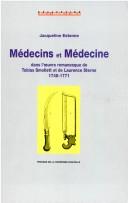
ISBN: 2878548515 2878540816 Year: 2017 Publisher: Paris : Presses Sorbonne Nouvelle,
Abstract | Keywords | Export | Availability | Bookmark
 Loading...
Loading...Choose an application
- Reference Manager
- EndNote
- RefWorks (Direct export to RefWorks)
La présente étude est née de l'observation d'une récurrence, celle du thème de la médecine dans la littérature du XVIIIe siècle, et tout particulièrement dans la production romanesque. Si ce champ de recherches a été défriché par des travaux ponctuels qui ont en quelque sorte ouvert la voie, il n'a pas, à ce jour, fait l'objet d'une exploration systématique comme celle que cette étude se propose de tenter. L'entreprise conduit naturellement à une réflexion méthodologique. Explorer la médecine d'une époque par le biais de la littérature aurait pu, il y a encore quelques décennies, passer pour de la provocation. Se confinant dans les limites d'un narcissisme étroit, la critique littéraire, sauf à se livrer à des investigations thématiques dans un esprit purement descriptif et mimétique, se refusait obstinément à solliciter l'apport constructif de l'Histoire des Idées. La vogue croissante de l'historiographie au cours des dernières années rend le dessein beaucoup moins subversif. Distincte de l'histoire traditionnelle et moins restrictive, cette discipline a pour but d'opérer une synthèse entre les différentes branches de l'histoire philosophique, religieuse, histoire des sciences et des mentalités. Par le tableau synoptique qu'elle se propose, l'historiographie met l'accent sur la relativité de l'interprétation historique.
Medicine in literature. --- English fiction --- Literature and medicine --- Medical fiction --- Physicians in literature. --- History and criticism. --- History --- Smollett, T. --- Sterne, Laurence, --- Knowledge --- Medicine. --- Characters --- Physicians. --- Medicine and literature --- Medicine --- Medical care in literature --- Sterne, Laurence --- Stʻērn, Lawrēns, --- Yorick, --- Stern, Lourens, --- Stern, Lorens, --- Стерн, Лоренс, --- Στερν, Λωρενς, --- Iorik, --- Sterne, --- Sŭtʻŏn, Lorensŭ, --- Smollet, T. --- Smollett, Tobias George, --- Smollett, Tobias, --- Author of Roderick Random, --- Roderick Random, Author of, --- médecine --- médecins --- œuvre romanesque
| Listing 1 - 10 of 17 | << page >> |
Sort by
|

 Search
Search Feedback
Feedback About UniCat
About UniCat  Help
Help News
News